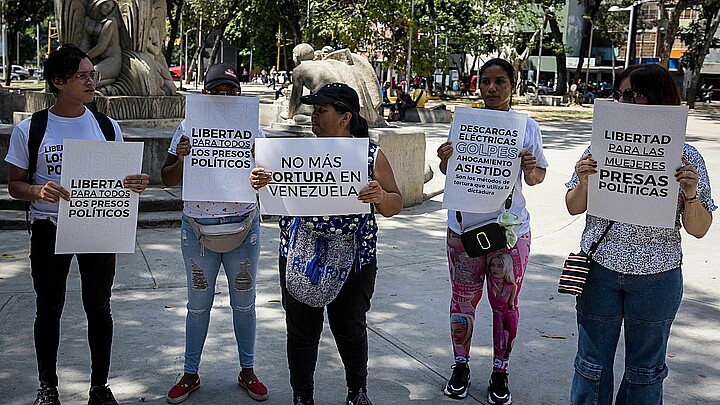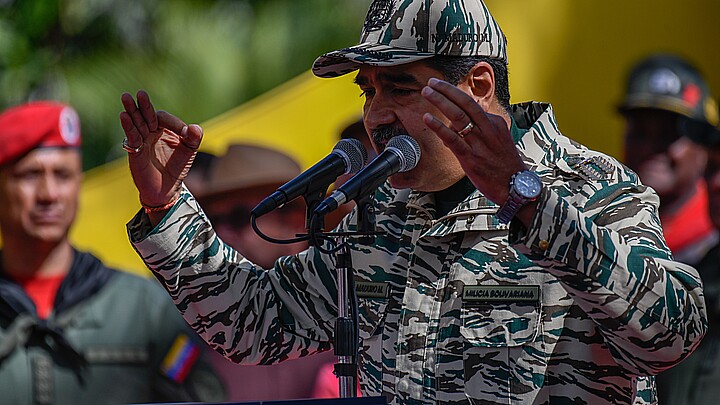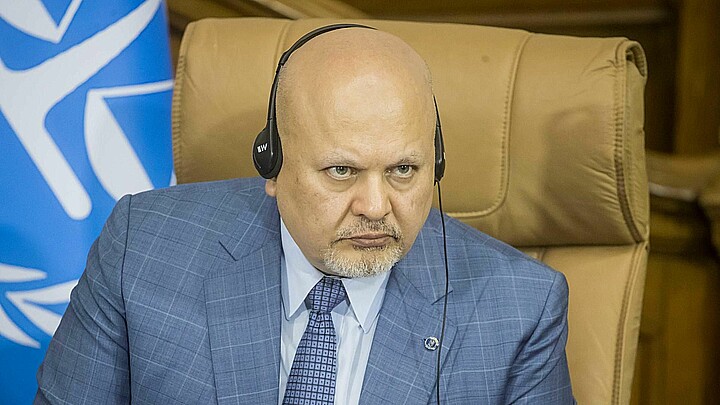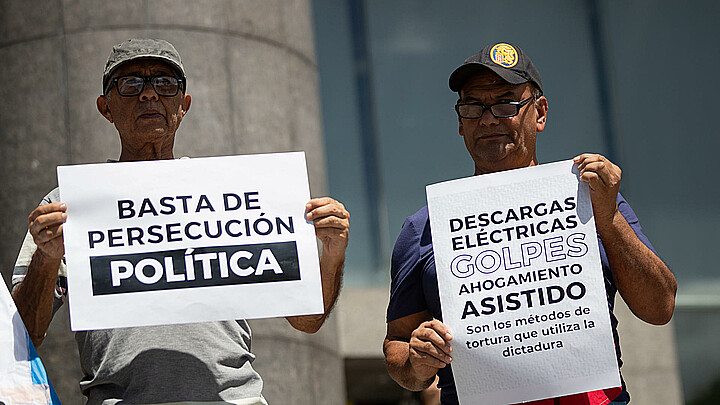Human Rights
Guaido’s party participates in Sunday elections he says are not free or fair
After four-years of an opposition boycott to Venezuela’s sham elections, one coalition runs candidates against the Maduro regime with only one pro-democracy party abstaining on principle
November 21, 2021 11:39am
Updated: November 21, 2021 1:46pm
A united coalition of pro-democracy political parties will participate in Sunday’s regional mayoral and gubernatorial elections for the first time in four years after receiving purported guarantees from the Maduro regime it will not interfere with the voting process.
The group, the Democratic Unity Roundtable (MUD), which has boycotted elections since 2017 ended the boycott in September, releasing a statement then that it would participate in the November 21 elections for the first time in four years after “difficult internal deliberation” and the “urgency to find permanent solutions.”
The voting process will be monitored by 100 observers from the European Union at about a thousand of the 14,400 voting precincts, after a 15-year gap. The last time the European Union observed elections in the embattled communist country was 2006.
Since early in the day, witnesses in Venezuela reported irregularities such as the use of false credentials, changes of voting centers without prior notice and low voter turnout according to correspondents in Petares and Oriente
"I am going to go inside to see if they find me with my fingerprints, but it is strange, it has never happened to me, that I was not on the list. I don't understand what happened," expressed a Petare resident to ADN America declaring her absence in the electoral roll.
"The truth is that the electoral environment is null. It must be because of agreement [with] the international observers that the Chavistas would not wear red. There are no [groups of] people wearing red, and no motorized collectives are seen, but the presence of Chavismo is perceived in the precincts," explained the ADN America correspondent in a telephone conversation to her editor.
There were also several reports of journalists being prevented from interviewing voters at precincts, reported ADN America's correspondent in Venezuela.
#AlertaSNTP | Plan República y PoliMérida impidieron al periodista Jesús Quintero, de Mérida es Noticia, tomar fotos y cubrir votación de candidatas por la MUD al concejo municipal de Libertador, en #Mérida.
— SNTP (@sntpvenezuela) November 21, 2021
El hecho ocurrió en el Liceo Romulo Betancourt de Los Curos. #21Nov
National Guard officers reportedly prevented journalistic activities in some stations in Lara, Portuguesa and Merida.
Juan Guaido, who is recognized by the U.S. as the legitimate president of the country said Friday he does not believe the elections will be free, fair or verifiable.
“Our position on that event (the November 21 elections) has been very firm, and in recent weeks, the facts supported that there are no conditions for a free and fair election in Venezuela. We have said that we respect the decision of the Unity parties that decided to go through the process as a tool of struggle…” Guaido said yesterday in a statement released by his national communications center.
Hay una certeza después del #21N: Maduro seguirá siendo ilegítimo, desconocido y además investigado por la CPI. Ya él y su régimen saben las consecuencias de burlar las reglas democráticas
— Juan Guaidó (@jguaido) November 19, 2021
Estamos en dictadura, debemos salir de ella y el llamado es a luchar unidos hasta lograrlo pic.twitter.com/tOSow6aMFt
Although Guaido expressed concerns about the upcoming vote, his political party is one of those participating in today’s elections. The only opposition party not participating is ‘Vente’ led by Maria Corina Machado, a staunch anti-Maduro political leader who recently called for a “peace and stabilization operation” in Venezuela to remove Maduro.
"Today, the question is: If you participate, are you helping to accelerate the exit of the regime or are you postponing it by giving it legitimacy and thus stability? This is not an election, but a simulation that allocates spaces without real power. This struggle requires delegitimizing and destabilizing tyranny", said Machado on Twitter.
Hoy,la pregunta es: Si participas, ayudas a acelerar la salida del régimen o la postergas al darle legitimidad y con ello estabilidad?
— María Corina Machado (@MariaCorinaYA) November 21, 2021
Esto no es una elección, sino una simulación que adjudica espacios sin poder real.
Esta lucha requiere deslegitimar y desestabilizar la tiranía.
Some Latin America pro-democracy activists who closely monitor the region are skeptical agree with Guaido and believe the EU’s attempts to offer electoral integrity are fatal as long as Maduro’s communist apparatus remains in power.
Dr. Orlando Gutierrez, the U.S. based Coordinator of the Assembly of Resistance, the main coalition of the Cuban freedom movement, which has closely monitored elections and also conducted electoral observations throughout the Latin American region told ADN America on Saturday that despite a voting process, he believes the deciding vote will be cast by Maduro’s regime.
“There is no chance the election will be fair because the main supervisory body—the people that actually count the votes—is controlled by the body that also controls the state, and is an extension of state power, he said. “It is not a neutral arbiter of state elections.”
A resident of El Valle to ADN America that he was not on the list of his polling station where he has been voting for more than 40 years. "I came early. I have been waiting for three hours, and the staff at the center is very kind, but I am not on the list, nobody is doing anything. I think I will be left without voting. I have heard of two similar cases."
Days before, opposition leaders in Venezuela have heralded a call to their supporters in attempts to energize the electorate, hoping to stun Maduro and install pro-democracy officials throughout the country. They have focused their campaign on criticizing Venezuela’s collapsing economy and failed public services.
“There is no water here. There is no electricity. There is no food. We have nothing but hope,” said Eva Prieto, a 52-year old lawyer and opposition supporter in an interview with Reuters during a regional gubernatorial campaign event in the western state of Zulia.
If polls are any indication, her candidate, Manuel Rosales, a 68-year old attorney who previously served as governor from 2000-2008 should be one of the opposition candidate to prevail in today’s showdown.
The Zulia region, famous for its oil industrial centers shortages of gas, water and electricity, and the area population has endured numerous blackouts without power.
Still, polls and actual voting in a totalitarian country living under the iron rule of Maduro are two different realities, and among the 21 million registered voters in the country of more than 28 million, actual turnout is expected to be low. Some reports indicate Maduro has encouraged his allies to run as candidates just to help split the vote against the democratic opposition.
“Totalitarianism is not always based on a single party,” Dr. Gutierrez told ADN America. “For example, in China, there are five purported opposition parties, but these parties become pawns of the ruling elite to remain in power. We’ve seen this before in Europe as well in [Soviet bloc] countries like Poland and Hungary.”
Despite this, Rosales has remained optimistic, telling supporters in the state capital of Maracaibo, “We are going to stop the destruction and Zulia will enter another stage of history.
In October, Nordic and Mexican officials unsuccessfully tried to facilitate agreements between the opposition and Maduro in Mexico City with hopes of ending political gridlock on how to address the country’s many developing crises.
Maduro pressed hard for the lifting of U.S. and European sanctions while the opposition demanded the release of political prisoners and guarantees of free and fair voting processes for Sunday’s election, and Maduro ultimately walked away from the table.
Similar talks occurred in Barbados in 2019 and at the urging of the Vatican in 2016, both with similar unsuccessful results.
“Conditions are simply not there for upcoming talks to provide a ‘big bang’ moment that will dislodge [Maduro] from the palace and immediately restore democracy,” Maryhen Jiminez, an Oxford academic at the Latin American Centre recently wrote in Americas Quarterly.
The U.S. has hinted at the possibility of easing sanctions if Maduro demonstrated progress in his negotiations with the opposition. It continues to support Guaido whom the U.S. recognized as the country’s legitimate president in 2019 after the elections were largely seen by most nation-states as fraudulent.
The country’s continued problems have resulted in the world’s greatest modern exodus. The Organization of American States has estimated that by 2022 about seven million people will have fled the communist country in hopes of establishing residency or citizenship elsewhere.
ADN America Staff and Venezuelan correspondents contributed to this report











